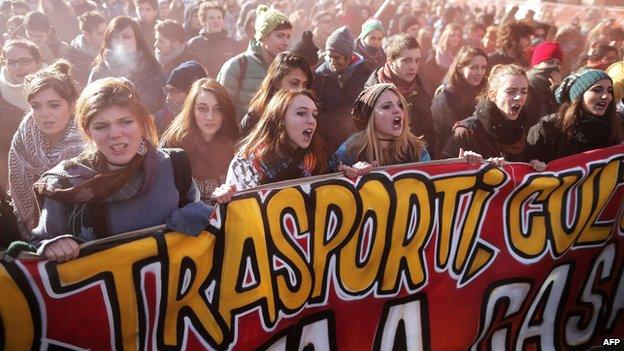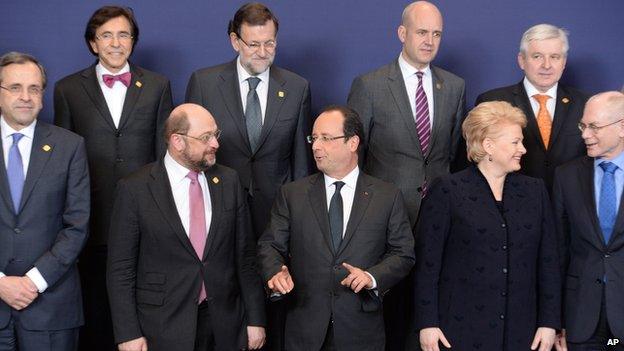2014: Europe's year of decision
- Published
- comments

Turin, Italy: The anti-austerity "Pitchforks" movement has gained strength
2014 will be the year when Europe's voters get to deliver their verdict on the European Union.
The European elections in May are not intended as a referendum, but there will be plenty of parties determined to make the vote about the European project itself.
Across much of the EU, anti-establishment parties have been polling strongly. They have very different agendas but most of them are anti-immigrant, anti-euro, anti-austerity and anti-Brussels and its power.
Some of them, like Marine Le Pen's National Front (FN) in France and Geert Wilders's Freedom Party (PVV) in the Netherlands, have been leading in the polls. The two leaders have formed a loose alliance to "fight the monster called Europe".
If these anti-EU parties get above 30% of the seats they could disrupt the working of the increasingly important European Parliament.
Two points worth remembering: these disparate parties will struggle to work together. Some are from the left, some from the far right and some, like the Five Star Movement in Italy, campaign against the political establishment. Also, the stronger they poll the more likely it is that the established parties in the European Parliament will form alliances to push through their own agenda.
In the UK, Nigel Farage and the UK Independence Party (UKIP) will be wary of any alliance with parties which might be branded extreme.
But expect an epic struggle: European leaders and the Brussels establishment will denounce these newer parties as extremists and xenophobes. They, in turn, will direct their fire on what they see as an out-of-touch elite.
Struggle for top jobs
The game is already under way in the corridors and friteries of Brussels: who will land the big jobs? The president of the Commission, the president of the European Council and the president of the Parliament are all up for grabs. Already the jockeying for position has begun. Like a roll-call of the European establishment, MEPs, commissioners and former senior ministers like Schulz, Rehn, Verhofstadt, Juncker, Barnier, Reding etc are all happy for it to be known they are available.
But the real story is that the procedure for nominating the all-important post of President of the European Commission is messy and imprecise. No one knows the rules by which the game will be played. There is likely to be a tussle between the newly-elected European Parliament and national leaders over who makes the final choice. Diplomats are saying the game will be played "late and fast" and some are warning of "severe institutional conflict".

European Council: 2014 will bring changes at the top in EU institutions
The British member of the Commission is currently Cathy Ashton, the High Representative for Foreign Affairs. It will be hugely significant who the UK nominates as EU commissioner and what job in the Commission the UK government pursues.
Two countries to watch
France. The mood in France is sour. Protests are widespread. In Brittany there have been the stirrings of a tax revolt and the economy may head back into recession. President Hollande is struggling to make good on his promise to reduce unemployment by the end of 2013. The numbers of the jobless, at 3.29 million, are still rising, albeit more slowly. Only a very loose interpretation of the statistics supports the president's statement that the "reversal of the unemployment curve… has truly begun". In the pipeline are more lay-offs. The sense of malaise may well reveal itself on the streets. And elsewhere in Europe there are mutterings that the French economy is holding back the rest of the eurozone.
Italy. President Napolitano has been warning of social unrest with companies on "the brink of collapse". Here, too, there is the emergence of popular anger with the "Forconi" (Pitchforks) protests. The country needs fundamental reform, both to its labour laws and its electoral system. But above all, after 12 years of stagnation it needs growth. Italy is hoping that in exchange for implementing reforms Brussels will allow it flexibility on reducing its deficit. One sobering thought: over four years into this crisis Italy's debt-to-GDP ratio has jumped to 133%.
Jobless recovery
In the final weeks of 2013 Europe's leaders hammered together the outline of a banking union.
There is still much to be argued over. But the real crisis in the EU is that 26 million people are out of work. In Spain, for instance, 27% of the workforce is unemployed.
There have been some glimmers of improvement but nothing to suggest significant falls in the numbers out of work. The Commission's own figures suggest a jobless recovery. The biggest fear in Brussels is of mounting frustration, turning voters against the EU. "What is at stake," said the head of the IMF Christine Lagarde, "is Europe's potential for growth in the future".
It was apparent at the summit just before Christmas that the appetite for further reforms in the eurozone is waning while the markets remain calm. Further steps towards greater solidarity - like offering grants, loans and guarantees to help the struggling countries - were essentially kicked into the long grass.
But the eurozone crisis is not over and for many of those countries forced to become more competitive there are severe social costs.
Merkel 3
Angela Merkel begins her third term as German chancellor. Will she be the same cautious German leader as before? Or will she lead Germany into accepting greater responsibility for the rest of Europe? Already - as part of the coalition deal with the Social Democrats - there will be increased spending at home on social programmes like pensions. The retirement age for some German workers will actually fall and the new measures will add more than 20bn euros (£17bn; $27bn) to German budget expenditure.
Countries in southern Europe - and France - are hoping for much more. They want to see Germany boosting domestic demand to help the exports of other eurozone countries and they hope the new coalition will soften Angela Merkel's insistence on austerity and structural reforms.
World War 1
Much of Europe - in particular the French and the British - will hold ceremonies to remember what is known as the Great War. There will be significant commemorations marking the centenary of the outbreak of war. The Germans, so far, have proved less interested in remembering the 1914-1918 conflict. It is World War 2 that still shapes their politics and outlook towards Europe. But the centenary events will serve as a reminder about what inspired European integration and the creation of what became the European Union.
Migration
Migration will be a leading factor - particularly in Britain - in the run-up to May's European elections. It is clear that when working restrictions are lifted this week some Romanians and Bulgarians will seek work in Britain. If the numbers are significant the political pressures will build. Any further steps to restrict freedom of movement will lead to increasingly bitter words between European commissioners and the UK government.
Brussels will continue to demand that evidence - numbers - be produced to show that migrants are moving in order to claim benefits. They will also fight to protect freedom of movement, which is regarded as one of the cornerstones of the EU and its single market. The UK has potential allies over so-called "benefits tourism", but very few countries would be willing to weaken freedom of movement.
What does the UK want?
Those of us who spend time in Brussels and Europe's capitals are frequently asked "what does the UK really want?" Neither Europe's leaders nor officials are clear what the UK will seek as part of renegotiating its relationship with the EU.
There are some countries that privately question whether the EU might not be better off without the UK, but they are very few in number. Some argue, like the Italians, that to have one of the strongest European economies outside the EU would damage the whole project.
What Europe's leaders will hope is that in 2014 the British position becomes clearer. Will the UK insist on repatriating some powers? Will it seek to protect itself from "ever closer union?"
When David Cameron speaks about reforms in the EU he has allies. It is wrong to portray the UK as entirely isolated, but building support for a more flexible EU and winning concessions will be a formidable task.
What the British government will be looking for in 2014 are indications that Germany wants a new treaty - to give proper legal backing to the extra powers that the eurozone crisis has handed to Brussels. Treaty change would open the door for Britain to bring its demands to the table.
So 2014 will reveal whether the EU has fallen out of favour with millions of Europe's voters. The biggest challenge is whether this union of 28 members can deliver growth and prosperity, or whether years of stagnation lie ahead.